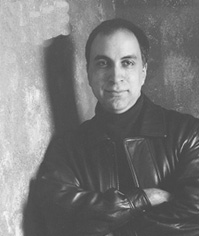
Composer Anthony Cornicello (born in Brooklyn, New York, 1964) writes music that blurs distinctions between performers and electronics, timbre and harmony, composition and improvisation, and explores the boundaries of what may be considered post-classical concert music. His music is vibrant and visceral, full of rhythmic energy and harmonic sophistication, and his forays into live electronics have led to exciting combinations of instruments and processed sound. Cornicello’s background as a jazz pianist is evident not only in the rhythmic activity of his music, but also in his constant investigation of the rich sonorities available from a variety of instruments.
He has been commissioned to write music for the Scorchio Electric String Quartet, ModernWorks! (funding from Meet the Composer/ Commissioning Music USA), the Auros Group for New Music, the Prism Saxophone Quartet, the New York New Music Ensemble, David Holzman, the Group for Contemporary Music, and the InterEnsemble of Padova, Italy. His work has also been featured on the Guggenheim Museum’s “Works and Process” series. Cornicello’s works have also been performed by the Chicago Civic Symphony, Parnassus, ALEA III, Composers Concordance, Madeleine Shapiro, Robert Black, among many other outstanding groups and solo performers. His music has been presented as part of the Darmstadt International Festival of New Music as well as the June in Buffalo Festival.
Cornicello’s Second String Quartet has been recorded by the Atlantic String Quartet; the Second Sonata for Piano by David Holzman (Centaur). More recently, his Post-Modern Waltz was recorded by Eric Moe for Albany Records. A portrait CD of Cornicello’s works is scheduled for 2006 release on Albany Records.
As a performer, he has conducted or played piano in his own works on numerous occasions. While a graduate student at Rutgers, he formed and directed the Janus Ensemble, a group dedicated to contemporary music. More recently, Cornicello has begun performing on the laptop, using a variety of interfaces and the Max/MSP program. Those performances, mostly with EEE!, have had a notable impact on his music, as EEE!’s music ranges from hip-hop to experimental noise. EEE! is based at Eastern Connecticut State University, where Cornicello is an Associate Professor and Director of the Electronic Music Lab.
Cornicello received the Ph.D. from Brandeis University, where he studied with David Rakowski, Eric Chasalow, and Martin Boykan. His teachers also include Charles Wuorinen, Gérard Grisey, and Richard Beirach.
His current fields of interest include developing unusual interfaces for live computer music performances, as well as continuing to investigate resonance and spatialization. His recent and current projects (mostly for string instruments and electronics) have been exploring the latter two, and the series of experimental works ReZenant Garden, performed by EEE! have operated on all three areas of interest. Future projects will include works for instrumental groups or soloists and electronics, as well as turntablists.
Cornicello's works are published by C.F. Peters Corporation and APNM, and he is a member of BMI.
|
|
|
|
|
|

Sunday, May 18, 2008
Ageism, or justifiable limits?
Hello again!
Every now and then, a discussion flares up on a listserv like SCI's "scimembers" group. The issue of age limitations on competitions has come up in the past, and it recently generated a lot of discussion.
In a nutshell, here's the issue: some competitions have an age limitation on composers. We've all seen things that read: "for composers who have not reached their 35th birthday by Nov. 1, 2008." This has angered some on the board, claiming that this is unfair.
Disclaimer: I just turned 44 last week.
One thing to consider is the goals of the sponsoring organization. Is it in their charter statement, that funds for a particular grant must be given to younger composers? It's not uncommon for a granting organization to be limited to a specific geographical area, so why not age?
Then again, are there competitions for those above a certain age? I seem to recall a few of those, but I don't have any concrete examples in front of me. From what I remember, the Guggenheim Foundation does not want students to apply, so that is a similar case. Then again, they never seem to give me money....
The issue of the "emerging" composer came up - and this is where it gets truly vague. What, exactly, is an "emerging" composer? Is it a composer who has recently finished his or her formal studies? (How many composers finish their grad school before they are 30?) Is it a composer who has "found his voice"? When does that occur, and who certifies a new voice? Is it a composer who has attained some sort of recognition? I know composers who are in their 60s who still apply for funding that is reserved for "emerging" composers - is that wrong?
This argument can (and did) go in many directions. Personally, I understand wanting to restrict entries in many ways. I understand that a 20 year old composer may need additional help, a little boost, that might help start a career - and that same boost may be silly if a 50 year old tried to make use of it. And, I too lament the idea of not being eligible for some funds, simply because of my age. What do you all think?
NOTE: I seem to have developed a nasty habit of writing "part 1" and never writing "part 2". I'm preparing some follow-up posts on SEAMUS, and improvisation.
posted by Anthony Cornicello
|
| |



